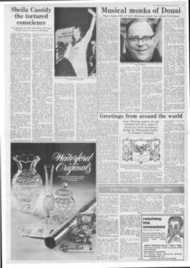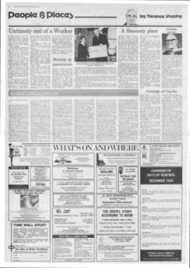Page 2, 30th November 1984
Page 2

Report an error
Noticed an error on this page?If you've noticed an error in this article please click here to report it.
Tags
Share
Related articles
Jerzy Peterkiewicz Talks To Luke Coppen About The Pope's...
John Paul To Mark 25 Years As Pope With Eagerly-awaited...
Revealed: The Russian Soldier Who Saved The Pope's Life
The Vatican's New Prime Minister
Unleashing A Force Called Man
`Archive mouse' to papal right-hand man
AGOSTINO Casaroli was already working in the Vatican when Karol Wojtyla began studying for the priesthood in wartime Cracow. He was still working in the Secretariat of State when Wojtyla was elected Pope in 1979.
Cardinal Casaroli's seventieth birthday on November 24 was an ' occasion to assess the Secretary of State and his relations with the first Polish Pope.
On the Pope's election, it was predicted that he would dispose of Cardinal Casaroli and there have been recurrent rumours since that the Cardinal will resign, the latest inspired by the drastic criticism of East European regimes in the liberation theology instruction. But it seems the WojtylaCasaroli link is durable.
Cardinal Stefan Wyszynski was suspicious of the Vatican's ostpolitik or at least wanted to be party to any Vatican dealings with the regime to prevent any agreement over his head — or behind his back.
As a result, Cardinal Wyszynski is said to have had reserves about Cardinal Casaroli who, in the 1960's, was the Vatican's man in Warsaw and ether Communist block capitals.
But Cardinal Wyszynski is believed to have recommended to the pope that he make Cardinal Cararoli his Secretary of State.
Perhaps it was on the principle of "the devil you know", or perhaps because he recognised that with the first foreign Pope in centuries, an Italian Secretary of State was essential and Cardinal Casaroli represented continuity, having served under four previous Pope's.
The present Pope not only made Cardinal Casaroli his Secretary of State but gave him a series of special assignments. Prominent among them were full powers in the Vatican Bank affair, final consultant on the New Code of Canon Law and Presidency of the EuropeanUnited States Bishops' Meeting on Nuclear arms. Also breaking with tradition, the Pope has taken Cardinal Casaroli with him on his foreign visits.
It all suggests that, although the background of Pope John Paul and the Cardinal are very different, they manage to work together fruitfully.
Cardinal Casaroli is capable of giving a good name even to the Roman Curia. Much of his early career was spent in obscure tasks, often in the Secretariat of State archives. He was what is called an "archive mouse" and did not put his nose out of the Vatican, because of delicate health, for almost a quarter of a century when he began travelling to Eastern Europe.
Cardinal Casaroli's training and temperament dispose him to taking the long view. This fitted him to carrying out the East European policy which is a recognition that the Communist regimes are not transitory and that the Church must find ways of continuing its life within them.
The original aim of the policy, to bring some oxygen to the churches in the Communistbloc, persists. It means negotiations with Governments to allow the appointment of bishops and for other institutional arrangements.
Nominations of bishops in Rumania and Lithuania in October and November indicate that this patient work is still effective.
There is no reason to think Cardinal Casaroli even imagined this in itself was suffucient to fully revive the Church in the Communit zone; it is merely one of the conditions for it.
Cardinal Casaroli's acceptance of the Vatican Council's message that the Church must show its concern for mankind's weal and not merely its own rights is having an effect on all Vatican diplomacy. He offers a hope that the council's message can transform the Church's central administration: he stands for gradual modification of timehonoured structures.
His timescale for this reformist aim may be too long but for the moment it seems Wojtyla's dynamism and Casaroli's flexibility and patience work well together.
blog comments powered by Disqus













